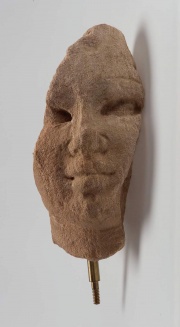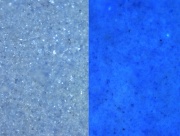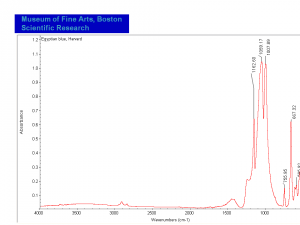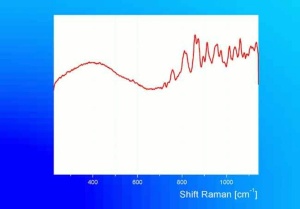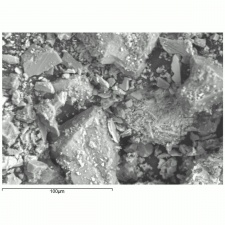Difference between revisions of "Egyptian blue"
| Line 1: | Line 1: | ||
| − | [[File:24.1797-SC119535.jpg|thumb|]] | + | [[File:24.1797-SC119535.jpg|thumb|Head of a queen<br>MFA# 24.1797]] |
== Description == | == Description == | ||
| − | + | [[File:bleupompeii C100x.jpg|thumb|Bleu pompeii at 100x (visible light left; UV light right)]] | |
A synthetic inorganic pigment composed of a double silicate of calcium and copper. Egyptian blue is prepared by heating a mixture of [[silica]], copper salts, and [[calcite]] in a [[sodium carbonate]] flux to 830 C. This forms a stable blue frit that usually contains some calcite and silica as impurities. Egyptian blue was used by the Egyptians over 5000 years ago as a pottery glaze and as a watercolor pigment in wall paintings. The colorfast pigment has coarse, irregular particles and ranges in color from a powdery blue to a royal blue. Similar materials, later manufactured in Italy and called Pompeian blue and Pozzuoli blue, have similar chemical compositions and optical properties. Egyptian blue is stable in all types of media and is unaffected by acids or alkali. | A synthetic inorganic pigment composed of a double silicate of calcium and copper. Egyptian blue is prepared by heating a mixture of [[silica]], copper salts, and [[calcite]] in a [[sodium carbonate]] flux to 830 C. This forms a stable blue frit that usually contains some calcite and silica as impurities. Egyptian blue was used by the Egyptians over 5000 years ago as a pottery glaze and as a watercolor pigment in wall paintings. The colorfast pigment has coarse, irregular particles and ranges in color from a powdery blue to a royal blue. Similar materials, later manufactured in Italy and called Pompeian blue and Pozzuoli blue, have similar chemical compositions and optical properties. Egyptian blue is stable in all types of media and is unaffected by acids or alkali. | ||
| − | [[ | + | [[[SliderGallery rightalign|Egyptian Blue.PNG~FTIR (MFA)|egyptblue632.jpg~Raman|fegyptsem.jpg~SEM (MFA)|fegyptedsbw.jpg~EDS (MFA)]]] |
== Synonyms and Related Terms == | == Synonyms and Related Terms == | ||
| Line 10: | Line 10: | ||
Pompeian blue; Pigment Blue 31; CI 77437; cuprorivaite (mineral); azul egipcio (Esp.); bleu égyptien (Fr.); bleu d'Alexandrie (Fr.); Ägyptisch Blau (Deut.); Frittenblau (Deut.); Pompejanischblau (Deut.); aigyptiako mple (Gr.); blu egiziano (It.); azzurro pompeiano (It.); fritta blue (It.); fritta egiziana (It.); Egyptisch blauw (Ned.); azul Egípcio (Port.); egyptinsininen (Fin.); lomentum (Lat.) puteolanum (Pliny); irtiu (Egypt.); Ägyptischblau (Deut.); Pozzuoli blue; Alexandria blue; blue frit; Vestorian blue; Italian blue; copper frit; Venetian blue; | Pompeian blue; Pigment Blue 31; CI 77437; cuprorivaite (mineral); azul egipcio (Esp.); bleu égyptien (Fr.); bleu d'Alexandrie (Fr.); Ägyptisch Blau (Deut.); Frittenblau (Deut.); Pompejanischblau (Deut.); aigyptiako mple (Gr.); blu egiziano (It.); azzurro pompeiano (It.); fritta blue (It.); fritta egiziana (It.); Egyptisch blauw (Ned.); azul Egípcio (Port.); egyptinsininen (Fin.); lomentum (Lat.) puteolanum (Pliny); irtiu (Egypt.); Ägyptischblau (Deut.); Pozzuoli blue; Alexandria blue; blue frit; Vestorian blue; Italian blue; copper frit; Venetian blue; | ||
| − | + | ==Physical and Chemical Properties== | |
| − | |||
| − | == | ||
Irregular particle shapes. Strong birefringence. Pleochroic from deep blue to colorless. Appears red with Chelsea filter. Ancient Egyptian blue may contain quartz and calcite as impurities. | Irregular particle shapes. Strong birefringence. Pleochroic from deep blue to colorless. Appears red with Chelsea filter. Ancient Egyptian blue may contain quartz and calcite as impurities. | ||
| Line 26: | Line 24: | ||
| e =1.59, w =1.63 | | e =1.59, w =1.63 | ||
|} | |} | ||
| − | |||
| − | |||
| − | |||
| − | |||
| − | |||
| − | |||
== Comparisons == | == Comparisons == | ||
[[media:download_file_503.pdf|Characteristics of Common Blue Pigments]] | [[media:download_file_503.pdf|Characteristics of Common Blue Pigments]] | ||
| − | |||
| − | |||
== Additional Images == | == Additional Images == | ||
<gallery> | <gallery> | ||
| − | File:42_Egyptian_blue_200X.jpg|Egyptian blue | + | File:42_Egyptian_blue_200X.jpg|Egyptian blue at 200x |
| − | File:42_Egyptian_blue_200X_pol.jpg|Egyptian blue | + | File:42_Egyptian_blue_200X_pol.jpg|Egyptian blue at 200x polarized light |
</gallery> | </gallery> | ||
| + | ==Resources and Citations== | ||
| − | + | * J.Riederer, "Egyptian Blue", ''Artists Pigments'', Volume 3, E. West FitzHugh (ed.), Oxford University Press: Oxford, 1997. | |
| + | |||
| + | * Pigments Through the Ages: [http://webexhibits.org/pigments/indiv/overview/egyptblue.html Egyptian blue] | ||
* Nicholas Eastaugh, Valentine Walsh, Tracey Chaplin, Ruth Siddall, ''Pigment Compendium'', Elsevier Butterworth-Heinemann, Oxford, 2004 | * Nicholas Eastaugh, Valentine Walsh, Tracey Chaplin, Ruth Siddall, ''Pigment Compendium'', Elsevier Butterworth-Heinemann, Oxford, 2004 | ||
| Line 63: | Line 56: | ||
* Thomas B. Brill, ''Light Its Interaction with Art and Antiquities'', Plenum Press, New York City, 1980 | * Thomas B. Brill, ''Light Its Interaction with Art and Antiquities'', Plenum Press, New York City, 1980 | ||
| − | * Website | + | * Website: http://www.coloria.net/varita.htm - foreign language equivalent terms |
| − | |||
| − | |||
| − | * | + | * Art and Architecture Thesaurus Online, https://www.getty.edu/research/tools/vocabulary/aat/, J. Paul Getty Trust, Los Angeles, 2000 |
[[Category:Materials database]] | [[Category:Materials database]] | ||
Revision as of 13:33, 1 August 2022
Description
A synthetic inorganic pigment composed of a double silicate of calcium and copper. Egyptian blue is prepared by heating a mixture of Silica, copper salts, and Calcite in a Sodium carbonate flux to 830 C. This forms a stable blue frit that usually contains some calcite and silica as impurities. Egyptian blue was used by the Egyptians over 5000 years ago as a pottery glaze and as a watercolor pigment in wall paintings. The colorfast pigment has coarse, irregular particles and ranges in color from a powdery blue to a royal blue. Similar materials, later manufactured in Italy and called Pompeian blue and Pozzuoli blue, have similar chemical compositions and optical properties. Egyptian blue is stable in all types of media and is unaffected by acids or alkali.
Synonyms and Related Terms
Pompeian blue; Pigment Blue 31; CI 77437; cuprorivaite (mineral); azul egipcio (Esp.); bleu égyptien (Fr.); bleu d'Alexandrie (Fr.); Ägyptisch Blau (Deut.); Frittenblau (Deut.); Pompejanischblau (Deut.); aigyptiako mple (Gr.); blu egiziano (It.); azzurro pompeiano (It.); fritta blue (It.); fritta egiziana (It.); Egyptisch blauw (Ned.); azul Egípcio (Port.); egyptinsininen (Fin.); lomentum (Lat.) puteolanum (Pliny); irtiu (Egypt.); Ägyptischblau (Deut.); Pozzuoli blue; Alexandria blue; blue frit; Vestorian blue; Italian blue; copper frit; Venetian blue;
Physical and Chemical Properties
Irregular particle shapes. Strong birefringence. Pleochroic from deep blue to colorless. Appears red with Chelsea filter. Ancient Egyptian blue may contain quartz and calcite as impurities.
Insoluble in acids. Unaffected by light or heat.
| Composition | CaCuSi4O10 |
|---|---|
| Refractive Index | e =1.59, w =1.63 |
Comparisons
Characteristics of Common Blue Pigments
Additional Images
Resources and Citations
- J.Riederer, "Egyptian Blue", Artists Pigments, Volume 3, E. West FitzHugh (ed.), Oxford University Press: Oxford, 1997.
- Pigments Through the Ages: Egyptian blue
- Nicholas Eastaugh, Valentine Walsh, Tracey Chaplin, Ruth Siddall, Pigment Compendium, Elsevier Butterworth-Heinemann, Oxford, 2004
- The Dictionary of Art, Grove's Dictionaries Inc., New York, 1996 Comment: 'Pigment'
- R. J. Gettens, G.L. Stout, Painting Materials, A Short Encyclopaedia, Dover Publications, New York, 1966 Comment: ref index=1.605;1.635
- G.S.Brady, Materials Handbook, McGraw-Hill Book Co., New York, 1971 Comment: p. 611
- Ralph Mayer, A Dictionary of Art Terms and Techniques, Harper and Row Publishers, New York, 1969 (also 1945 printing)
- Monona Rossol, The Artist's Complete Health and Safety Guide, Allworth Press, New York, 1994
- Thomas B. Brill, Light Its Interaction with Art and Antiquities, Plenum Press, New York City, 1980
- Website: http://www.coloria.net/varita.htm - foreign language equivalent terms
- Art and Architecture Thesaurus Online, https://www.getty.edu/research/tools/vocabulary/aat/, J. Paul Getty Trust, Los Angeles, 2000
